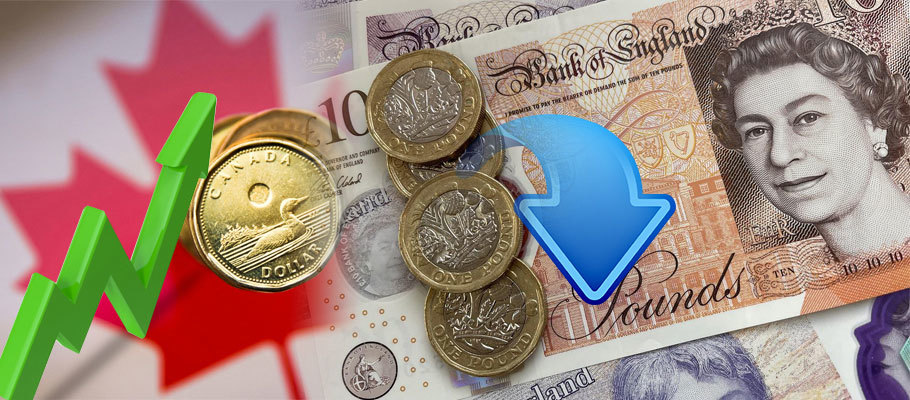
Published: February 15th, 2023
The Pound saw its third consecutive week of losses against a robust Canadian Dollar on Friday 10th February after a steep drop triggered by official numbers said Canada's labour market was undergoing its strongest expansion since February 2022.
GBP/CAD stepped back from a brief multi-month rally above September's all-time low, however analysts think it could still settle above recent moving averages if official data from the UK side point to a healthy British labour market.
'Recent Canadian labour market numbers won’t change the perception of economic overheating,’ said HSBC’s FX Strategy Unit in a Monday market analysis. 'While the number of new jobs created was surprisingly high, wage growth also stayed above four per cent.’
'The year-on-year wage rise of 4.4 per cent in January was the lowest posted since July, however the Bank of Canada believes that wage growth needs to fall below four per cent to keep inflation at its target two per cent ceiling.’
The Loonie started the week as an outperformer but a 150,000 rise in employment offset by softening wage growth sends mixed signals about the likely direction of Bank of Canada (BoC) interest rate policy.
Canada’s central bank said in January that the cash rate would probably stay at its current 4.25 per cent for the near term while BoC economists consider the impact of last year's rate rises on the domestic economy. That points to the possibility of last Friday's data being effectively set aside as a blip by Ottawa rate setters.
Sean Osborne, chief currency strategist at Scotiabank in Toronto, told Reuters that the limited number of data releases from Canada this week and next meant eyes would be focused on new US data, with investors looking for inflation and its impacts.’
In late 2022, analysts at Bank of Montreal (BMO) said that sliding oil prices were temporarily holding the Loonie back, but that an oil price recovery was expected at some point in 2023. That would give CAD support.
‘The unexpected decline in oil prices (in late December 2022) has trickled through to currency markets in ways we would expect,’ wrote BMO in a December forex briefing. For the Canadian Dollar, that’s manifesting as underperformance linked to oil market dynamics. ‘The surprising shift in crude prices is hammering commodity currencies like CAD.’
In fact, the Loonie was amongst the biggest G10 losers that month, though it wasn’t alone. The Norwegian Krone, Europe's top petrocurrency, was also on the back foot.
BMO said all these moves confirmed the oil linkage. ‘What we are seeing is a broad rally for oil importing currencies while oil exporter currencies suffer.’
The Pound to Loonie (GBP/CAD) exchange rate rose for five weeks in a row, extending an appreciating trend that first emerged in September 2022.
‘Canada's dollar is being held hostage by oil market dynamics,’ said Scotiabank’s currency strategy unit in an analyst note. 'Oil exporting currencies were some of the weakest performers this week, reflecting investor worries that a global economic downturn is likely on the horizon.’
GBP/CAD’s spot price was 1.6767 in mid-December 2022, with international payment rates for a standard bank account holding at roughly 1.62.
Back in May 2022, the historic link between oil prices and CAD looked like it had been broken forever.
The Loonie slipped against the greenback despite a significant rally in oil prices. Analysts said at the time that the divergence in crude and CAD pricing would probably to be temporary, though it wasn’t the first time the traditional crude-Loonie link had been severed.
CAD dipped by around half a percentage point against the Greenback across 2022. That was despite a 60 per cent increase in global crude prices and a 34 per cent gain for Canada’s benchmark Western Canada Select in the same timeframe.
For investors who follow petrocurrencies like the Canadian Dollar and Norwegian Krone, there's an expectation that prices will rise and fall in tandem with oil prices. The price action seen in May 2022 came as a shock to many. Analysts at Canada’s CIBC bank, however, noted that the relationship between CAD and oil had been evolving for years. Many forex traders simply hadn’t understood that things had changed.
In a market analysis, CIBC’s currency research unit wrote that ‘despite what we’ve witnessed in terms of CAD’s steadiness in the face of volatile crude prices, statistical evidence is building that supports the notion of a weaker link between oil and CAD, which tends to correspond with softening Canada-US interest differentials.
CIBC’s research showed that that capital spending and investment in Canada’s oil sector fell from almost four percent of GDP in late 2014 to just above one percent in 2021. That drop in capex happened regardless of oil price rises that occurred frequently through the period.
The take-away is that rising oil prices no longer came with a propensity to drive increased employment, income growth, or inflation. ‘That de-coupling has meant that oil prices have less influence than they used to on Bank of Canada (BoC) monetary policy,’ CIBC wrote.
‘If we consider the period from late 2018, when capital spending in the Canadian oil sector had finished its retrenchment, the correlation disappears completely, even dipping into negative territory at times. Investors have stopped looking at oil prices as a driver of relative interest rates between Canada and America’.
A weaker oil-dollar dynamic could also potentially lead to a reduction in the extent to which domestic Canadian oil companies use currency hedging to reduce the risk of exchange rate volatility, which often involves buying more Canadian dollars.
That raised the possibility that rising oil prices no longer came with a propensity to drive increased employment, income growth, or inflation. ‘That de-coupling would mean that oil prices have less influence than they used to on Bank of Canada (BoC) monetary policy,’ said CIBC.